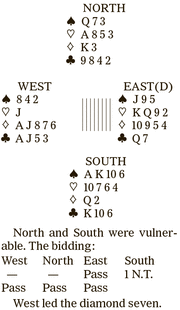New York Times – Mayo 11, 2014
A few bridge players have better reputations than they deserve. Perhaps more are underrated; one was Albert Dormer, who died at 88 on March 18 in Scotland, where he had moved upon retirement.
Dormer won the inaugural World Senior Pairs in 1990 in Geneva, partnered by Alan Hiron from England, and twice captured Britain’s premier event, the Gold Cup.

However, Dormer was best known as an excellent writer. In 1962 he became the editor of British Bridge World. And two years later he moved briefly to the United States, working for the American Contract Bridge League and as an editor of the Bridge Encyclopedia.
Back in England, he was the editor of World Bridge News from 1971 until 1986; the editor of the International Bridge Press Association Bulletin from 1973 to 1980; and the bridge columnist for The Times of London from 1990 to 1994. He also wrote or helped write 10 books on the game; sent daily reports from world championships to Reuters for years; and was the Press Association personality of the year in 1982.

Any budding writer would do a lot worse than to study his style.
The diagramed deal occurred during the victory in Geneva, an event scored by match points. Dormer (South) opened and closed the auction with one no-trump, showing 12 to 14 points.
West led a low diamond. Dormer could anticipate most North-South pairs, who were using the strong no-trump, either playing in two hearts (and making plus 110 on normal breaks) or defending against three diamonds (and collecting 50 or 100). Even making one no-trump looked like a tall order.
South played dummy’s king and East dropped the four, discouraging to deny the queen. Now if East could be kept off the lead, maybe West would not work out to cash his diamond ace. Dormer, hoping hearts would break badly, led the club nine from dummy, which was covered by the queen, king and ace.
West, trying to get his partner on lead, shifted to a spade. South took East’s jack with his ace and led the club ten. West took this trick (East played the seven) and tried a heart, but declarer won with dummy’s ace, led a club to his six, returned to dummy with a spade to cash the club eight and took four spades, one heart, one diamond and two clubs. Plus 120 was a top.
Note that declarer was lucky with the diamond honor location. If dummy had held the queen and he had the king, under dummy’s queen at Trick 1, East would have signaled count, not attitude. Then West would probably have worked out to cash his diamond ace and defeat the contract.
Also, West should have ducked the second round of clubs. When he took the third round, he could have seen East’s discard, which would have been the diamond five, remaining count showing an odd number left. If East had begun with only two diamonds, he would never have pitched his last card in the suit; that discard would have indicated that he had started with four diamonds. Then West would surely have found the winning defense.
Esta entrada también está disponible en: Spanish

